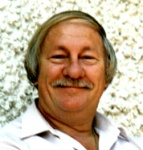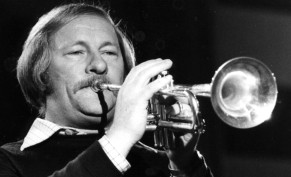Foreword
Big
Bands
Tommy Sampson
Leon Roy
Oscar Rabin
Vic Lewis
Squadronaires
Jack Parnell
Parnell 2
Ambrose
Geraldo
West Side Story
Ted Heath
Dankworth
Bill Russo
Studio work
Studio work 2
Bits & Pieces
Munich
Berlin
Berlin 2
Berlin 3
Saarbrucken
Saarbr. 2
Saarbr. 3
Herbolzheimer
Summing up
Ambrose

Bert Ambrose, the well known wartime bandleader, beloved in the West End hotels, formed a new orchestra, and asked me to join on first trumpet. It was an eight brass band again, which tempted me, because Jack’s band only had five brass. I preferred playing with the heavier brass combination, so I went with the Ambrose band.
Unfortunately for everyone Bert was, by this time, right at the lowest ebb of his career, all washed up as a bandleader. His had been the most feted, most successful of the London hotel orchestras, with all the best musicians, including the American clarinetist Danny Polo, and the singer Al Bowley. When the war began most of the Ambrose musicians joined the big service bands of the Squadronaires and Skyrockets. Now Bert was a shadow of his former self.
Johnny Keating was in the band, too, and had written a lot of the arrangements. Everywhere we went Bert became surrounded by dear old ladies wanting his autograph. They remembered him from the good old days, when he’d provided a smooth tinkling background to dinner, light conversation, and some romantic dancing. We were playing the music of Dizzy Gillespie and Woody Herman. It was impossible to play this music quietly, even in the heavy velvet-sounding bucket mutes. The old people looked dazed when they heard us. Where was the delightful dinkey-dinkey-do music they had loved so well?
When we played Ambrose used to hold his head and moan, ‘You’re destroying my band.’ It didn’t occur to him to get some other kind of music. He’d booked all the wrong guys anyway. Apart from Johnny and me, he had Charlie Messenger, Des Lumsden, Pete Pitterson, Tubby Hayes and Phil Seamen in the band. We were all ravers, and totally jazz orientated. He needed a Lawrence Welk type band for his purposes.
Nobody knew whether Bert had any talent as a musician, he certainly never displayed any, but when he got really fed up with the band he used to keep us quiet by threatening to play the violin.
He could never remember the names of the guys who were working for him. Every time Des stood up to take an alto solo, for instance, Bert would introduce him to the audience as Les Dumsden, and that was—mumble-mumble-mumble—on trombone over there. The band singer was a big, beautiful, soft, Irish girl named Carmell Quinn. Ambrose usually introduced her as Miss Caramel Quim.
Ambrose had the worst band bus of them all. We really froze in that one. I went up to complain about it one day. He was huddled up at the front under a blanket. I told him that the conditions were unsatisfactory, we were all threatening to leave if he didn’t get a better bus.
Suddenly he stood up and threw off the blanket.
‘How do you think I feel?’ he shouted. ‘I used to have a chauffeur-driven Rolls-Royce. Do you think I’m enjoying this?’
He stopped the bus and got out.
‘I’m getting the train. Play what you like when you get there. I may never turn up.’
At times like these he used to call me Mr. Big Shot.
‘How’s Mr. Big Shot today? Slept well? No complaints?’
We turned up at a ballroom on the Yorkshire coast one afternoon to find that the only advert for the band was a blackboard in the doorway with the chalked message AMBROSE TONIGHT.
‘We’re not playing,’ said Bert, ‘Not with that kind of publicity.’
He treated us to a slap-up champagne feast in the hotel that evening, was subsequently sued for non-appearance, and lost a whole lot of money on the case.
I couldn’t stand all this and went back to the Parnell band.
Later on, whenever I walked into a place where the Ambrose band was playing he would come off the stage like a shot and start talking to me.
‘Quick, say something—anything! Distract me! I can’t stand the way they play this introduction.’
I mentioned once that I was flattered by all the attention he showed me when we met.
‘There is only one thing in this world that I hate more than talking to you,’ he said, with the utmost sincerity, ‘And that is having to listen to this Godawful band every night.’
There is a story about Ambrose during his hey-day as a Park Lane hotel bandleader.
Turning up a little late one night at the hotel he found one of his tenor players, Mossie Kaye, sitting dejectedly on the steps outside the rear entrance.
‘What’s the matter with you, then?’
‘Oh Bert, the band sounds like a wart tonight. I can’t stand it in there.’
Ammie went in. A few minutes later he came out again.
‘Neither can I. Move over.’
The trombonist Charlie Messenger had a hard time finding work once the Ambrose band folded, so he joined a Guards army band. Normally this meant going into the barracks for a morning rehearsal, with the rest of the day free. He didn’t even need to put on a uniform. Great. That was the theory. Unfortunately Charlie joined at a time when his Guards regiment had the Buckingham Palace detail. The Lord Mayor’s Show was imminent, and Charlie had to don a uniform, with metal breastplate and a helmet with an enormous plume, and play his trombone on the back of a horse.
Of course he was petrified, never having been on a horse before. They calmed him by giving him a trusty old mare, very docile, but her back still seemed very big, and high up, and he had to spread his legs to almost splitting over the saddle.
Once out in the Mall the band started playing, with Charlie bumping and jogging all over the place, trying to keep the trombone on his lips. Then someone threw a firecracker, right under the horse’s hooves. The mare reared up in fear, and Charlie tumbled off, landing on the ground with a great clanging of metal, sounding like the collapse of a stack of dustbins..
‘To hell with this,’ he said, and struggled back to the barracks with his trombone bent into all kinds of weird shapes. Charlie told me this himself shortly afterwards while we were playing darts in a pub in Golders Green, and he even showed me the bruises.
The saxophonist George Watts has now told me of yet another incident. In this one the band was practising counter-marching on horseback. As Charlie approached the turn another horse going in the opposite direction got hold of his trombone slide between his teeth and wrenched it out of his grasp. I don’t know what happened to Charlie after all that, but it probably didn’t have too much to do with horses.
I soon became fed up with the band, as I believe everyone did. I went back to Jack Parnell's band. Things were definitely better organised there, and the job was far more dignified.
Copyright © 2001, Ron Simmonds. All Rights Reserved
